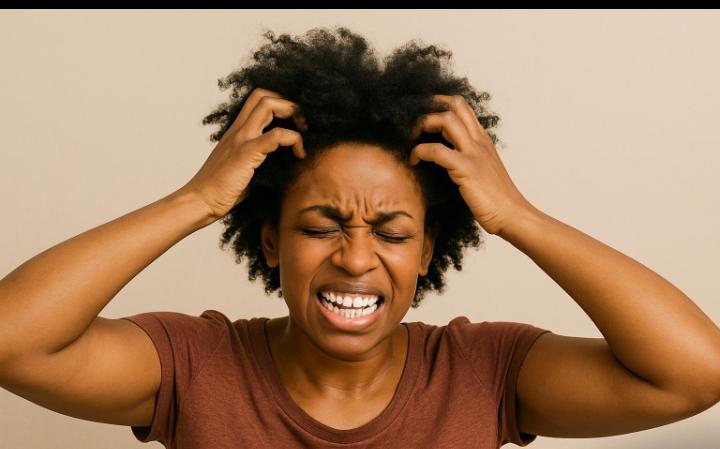 A woman with an itchy scalp/AI ILLUSTRATION
A woman with an itchy scalp/AI ILLUSTRATIONHave you ever walked out of a salon with a fresh, flawless hairstyle, feeling confident and ready to take on the world, only to get home and suddenly feel an intense urge to scratch your scalp?
That uncomfortable itch creeps in, and before you know it, you're reaching for anything within arm’s reach, even a pen, just to get some relief.
For many women, this scenario is all too familiar. But why does it happen?
An itchy scalp is a common condition that affects people of all ages. It can be irritating, sometimes embarrassing and in some cases, a sign of an underlying skin issue.
Although it is not always serious, persistent scalp itchiness can interfere with daily life and sleep, making it important to understand its causes and possible remedies.
What causes an itchy scalp?
An itchy scalp, medically referred to as scalp pruritus, can result from a variety of reasons ranging from dry skin to inflammatory skin conditions. Some of the common culprits include: dandruff, dry skin, allergic reactions and scalp proriasis.
According to Irene Akinyi, a salonist in Buruburu, dandruff occurs when the scalp becomes dry or oily and sheds skin flakes.
She added that the itchiness is often mild but can increase if not managed.
In some cases, the condition is linked to seborrheic dermatitis, which causes red, scaly patches on the scalp.
“Much like the skin on the arms or legs, the scalp can also dry out, especially during colder seasons or with frequent washing using harsh shampoos,” Akinyi said.
This dryness may cause itching and flaking that resembles
dandruff, but usually without the presence of oily flakes.
She mentioned air styling products, conditioners and even some shampoos can leave behind residue that accumulates on the scalp saying this buildup can clog follicles, irritate the skin and cause itching.
For allergic reactions, hair dyes and some scalp care products may trigger contact dermatitis, a condition where the skin reacts to an allergen.
Ingredients like fragrances, preservatives and certain chemicals in hair colour products are common triggers.
Scalp Psoriasis is a chronic autoimmune condition where the skin cells grow too quickly, leading to thick, scaly patches.
Psoriasis tends to run in families and often requires long-term care.
Other causes include head lice, fungal infections and poor hygiene.
“A fungal infection like ringworm can lead to an itchy, scaly scalp. It is contagious and may also cause hair loss in the affected area,” Akinyi said.
She added that infrequent washing of hair and scalp can lead to accumulation of sweat, dead skin cells and dirt, all in which may lead to discomfort and itching.
Some of the home remedies to relieve itchy scalp
For mild and non-serious causes, there are several home remedies that can help ease the itchiness and improve scalp health.
These do not require medical treatment and can be managed using simple household items.
Use of coconut oil
Coconut oil has soothing and moisturising properties. Applying warm coconut oil to the scalp can relieve dryness and reduce itching.
It may also help fight certain fungal infections due to its natural antifungal properties.
Aloe Vera
Fresh aloe vera gel can calm an irritated scalp. It provides moisture, reduces inflammation, and offers a cooling effect. Applying it directly and leaving it for 20–30 minutes before rinsing can bring relief.
Apple cider vinegar
Due to its antimicrobial and anti-inflammatory properties, apple cider vinegar can help with scalp infections and product buildup. It’s often used diluted with water and applied to the scalp for a few minutes before washing out.
Tea tree oil
Tea tree oil contains natural antifungal and antibacterial properties. When diluted with a carrier oil, it can be massaged into the scalp to help manage dandruff and mild fungal infections.
Lemon juice
Lemon juice has astringent qualities that can help balance oil production on the scalp. It’s useful for treating dandruff and refreshing the scalp but should be used in moderation due to its acidity.
Proper hair washing routine
Using a gentle shampoo and avoiding excessive washing can maintain the scalp’s natural oils. Clarifying shampoos once a week can help remove product buildup, but should not replace regular moisturising shampoos.
Cold compress
For instant relief from itching, a cold compress can reduce inflammation and numb the itchy area. It’s especially helpful for temporary irritation caused by allergic reactions.
Akinyi emphasised that not all itchy scalp issues can be treated at home.
“If symptoms persist for more than a week despite trying home remedies, or if there are signs of infection such as pus, swelling, bleeding, or intense pain, it’s advisable to seek medical attention,” she advised.
She also noted that it is important to know the cause is the key to choosing the right remedy.
Finally, she advised of regular scalp care, mindful use of
hair products and good hygiene practices saying it goes a long way in keeping
the itching at bay.
















